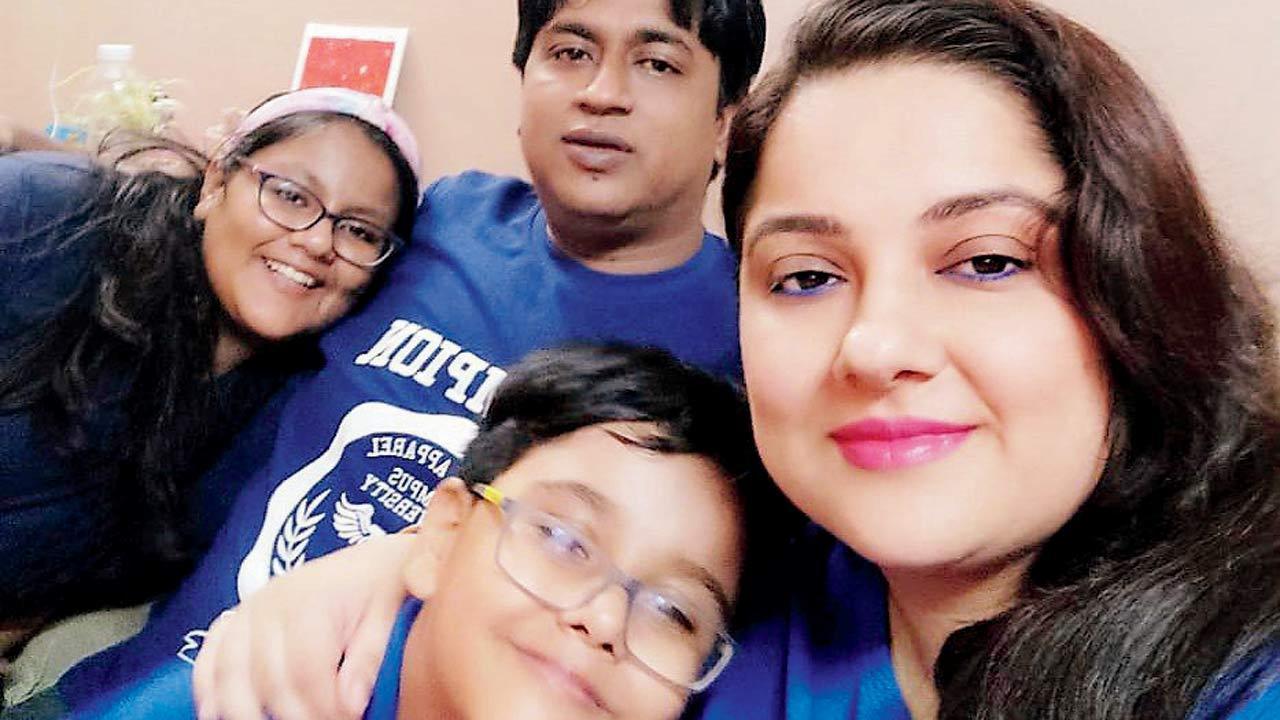Chartered Accountant Saleha Asim Khan (40) is just one of the thousands who overcame the virus while being at home

Saleha with husband Asim Khan and their daughter Amrah Khan and son Arham Khan during pre-COVID times
With so much attention on hospitalisation and bed availability, there hasn’t been much focus on a large section of Covid patients who are treated by their trusted general physicians and recover at home. While a patient in the hospital is in the complete care of doctors, home patients need all the support they need. Chartered Accountant Saleha Asim Khan (40) is just one of the thousands who overcame the virus while being at home.
ADVERTISEMENT
Saleha with hubby Asim Khan after she recovered from the infection
“Keep unwanted advices at bay, judge your symptoms and trust your GP, who knows you and your symptoms well,”’ said Saleha, who lives in an apartment in Mumbai Central’s Belasis Road with her husband Asim Khan (40), daughter Amrah (12) and son Arham (6). Dar, who works remotely for a British company, also runs an ACCA Education centre.
An Asthmatic patient since she was a child, she, her husband and daughter tested positive in April. “My husband took a test as he had a flight. When the report was positive, it was shocking. He had no symptoms. He had a flu and fever a week before that. He took medicines from our family physician and was fine. But then later, when his report came positive, I realised even I had cough, cold, fever and asthma for three days. We immediately booked a home test for me, my husband, my kids and our maid. By then labs were taking two days for testing. But as I am asthmatic, I couldn’t wait. I called my doctor, Wiqar Shaikh. He told me to immediately go for CT Scan and to get admitted if I had pneumonia,” said Saleha.
The Mumbai Central resident with Dr Wiqar Shaikh who has been treating her asthma for the past three years
She got her scan on April 21, which showed atypical viral pneumonitis. The CORAD classification was 5, CT severity score was 5/25 and lung involvement was 10 per cent to 15 percent. When she sent her reports to Dr Shaikh, he told her not to worry, gave her the complete line of treatment and encouraged her that she will be fine at home. Since their son was negative, they sent him to his grandparents.
“Fighting with COVID was not easy,” said Saleha. “I had a lot of cough, cold and asthma. I was facing a lot of breathing difficulty. My oxygen saturation was 93 or 94. But I decided to take treatment at home as the situation was already bad in hospitals. Being treated at home could be traumatic, especially when three people are positive. My mother-in-law Feroza Junaid Khan played a huge role, taking care of my son, and sending us daily meals even as the family was fasting for Ramzan. My husband, who was asymptomatic, also supported me.” To others like her, Saleha said the key is to not panic and get tested on time. “Stress will make it worse. I started thinking I will not survive, when I saw the reality in the country on the news. I worried what will happen to my kids if I needed oxygen and did not get it.
My paternal family, who are not in India, offered their moral support and prayers on phone. Today it is 14 days from the time my symptoms started, and by the grace of Allah, my condition is stable.” As a homemaker, working professional and mother, Saleha said those getting treated at home should keep negative thoughts away. “Don’t watch too much suffering videos as it gives you undue stress. Follow what your doctor says. If me, a childhood asthmatic person, can win this, you can also win this,” she concluded.
Dr Subhash Hira, Professor of Global Health at the University of Washington-Seattle
Lancet study on inhaled steroids
Dar’s physician, Dr Wiqar Shaikh, Professor, Grant Medical College and Sir JJ Group of Hospitals, said a Lancet report shows the effectiveness of an inhaled corticosteroid Budesonide in the treatment of Covid-19. Dr Shaikh recalled a case from April 2020 (‘How I was cured at home’, mid-day, April 27) when he prescribed a patient the inhaled Budesonide, which is an effective and safe steroid for the lung. The patient was also prescribed three different bronchodilators and two higher antibiotics. An oxygen cylinder was arranged for him at home and the patient was quarantined in a separate room. The patient improved within a few days and was off medications. Dr Subhash Hira, Professor of Global Health at the University of Washington-Seattle, and health advisor to several UN and Indian health agencies said, “There are over 100 repurposed drugs belonging to anti-viral and immune modulators that are being tested for treating Covid-related symptoms. Interim findings from the principal trial suggest that Budesonide shortens recovery time in non-hospitalised patients by a median of three days. It further suggested early administration of inhaled budesonide reduced the likelihood of needing urgent medical care. This long-acting steroid coats and blocks ACE-2 receptors in the nose, throat, and lungs from binding with incoming SARS-COV-2 and through anti-inflammatory action, it reduces the fibrotic process in lung parenchyma through local action.”
 Subscribe today by clicking the link and stay updated with the latest news!" Click here!
Subscribe today by clicking the link and stay updated with the latest news!" Click here!






